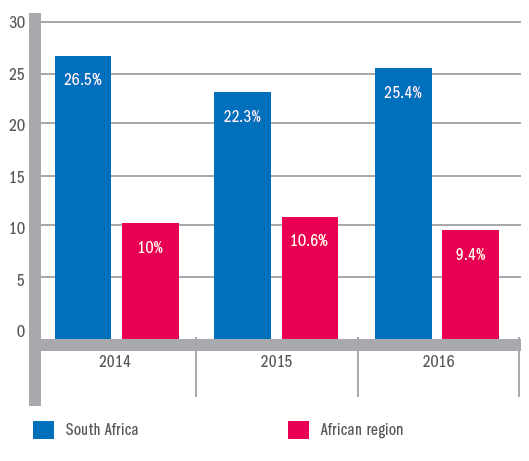Innovation and entrepreneurship are closely connected concepts. It is argued that entrepreneurs disrupt market equilibrium by introducing new product-market combinations into a market, teaching customers to want new things and driving out less productive firms as their innovations advance the production frontier. Innovation goes beyond just creating novel products and services. To commercialise their innovations, entrepreneurs need to identify new market niches and develop creative ways to offer, deliver and promote their products. All of this requires an awareness of competitive offerings, and the ability to incorporate this knowledge into distinct products and services. Innovation capabilities are thus important to economies’ ability to become competitive, particularly in higher-productivity sectors.
Twenty-two per cent of South Africa’s entrepreneurs in 2016 had products that were new to all or some customers AND few/ no businesses offered the same product, compared to 30% in 2015. The averages for Africa as a region and for the efficiency-driven economies over the same period remain the same, at 20% and 24% respectively. South Africa’s marked dip in innovation levels is therefore of concern, particularly given that business sophistication and innate level of innovation are important factors for efficiency-driven countries hoping to move up the value chain to the next phase of economic development.
For many entrepreneurs, internationalisation is a means to access larger and more diverse markets. In economies with large and relatively affluent internal markets, there may be less incentive for early-stage entrepreneurs to reach out to international markets. The ability to sell internationally is influenced by a range of factors: for example, the ability to conduct supply and distribution activities through the internet, particularly to the extent this facilitates international trade.
The graph below shows the percentage of early-stage entrepreneurs with 25% or more international sales, 2014 – 2016. It indicates that South African entrepreneurs display relatively high levels of strong international orientation, with a quarter of entrepreneurs reporting that 25% or more of their revenue comes from international sales. This is 2.7 times the average for the African region.





